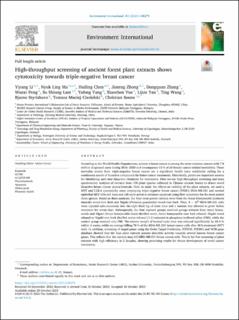High-throughput screening of ancient forest plant extracts shows cytotoxicity towards triple-negative breast cancer
Li, Yiyang; Ling Ma, Nyuk; Chen, Huiling; Zhong, Jiateng; Zhang, Dangquan; Peng, Wanxi; Shiung Lam, Su; Yang, Yafeng; Yue, Xiaochen; Yan, Lijun; Wang, Ting; Styrishave, Bjarne; Ciesielski, Tomasz Maciej; Sonne, Christian
Peer reviewed, Journal article
Published version

Åpne
Permanent lenke
https://hdl.handle.net/11250/3112245Utgivelsesdato
2023Metadata
Vis full innførselSamlinger
- Institutt for biologi [2526]
- Publikasjoner fra CRIStin - NTNU [37703]
Originalversjon
10.1016/j.envint.2023.108279Sammendrag
According to the World Health Organization, women's breast cancer is among the most common cancers with 7.8 million diagnosed cases during 2016–2020 and encompasses 15 % of all female cancer-related mortalities. These mortality events from triple-negative breast cancer are a significant health issue worldwide calling for a continuous search of bioactive compounds for better cancer treatments. Historically, plants are important sources for identifying such new bioactive chemicals for treatments. Here we use high-throughput screening and mass spectrometry analyses of extracts from 100 plant species collected in Chinese ancient forests to detect novel bioactive breast cancer phytochemicals. First, to study the effects on viability of the plant extracts, we used a MTT and CCK-8 cytotoxicity assay employing triple-negative breast cancer (TNBC) MDA-MB-231 and normal epithelial MCF-10A cell lines and cell cycle arrest to estimate apoptosis using flow cytometry for the most potent three speices. Based on these analyses, the final most potent extracts were from the Amur honeysuckle (Lonicera maackii) wood/root bark and Nigaki (Picrasma quassioides) wood/root bark. Then, 5 × 106 MDA-MB-231 cells were injected subcutaneously into the right hind leg of nude mice and a tumour was allowed to grow before treatment for seven days. Subsequently, the four exposed groups received gavage extracts from Amur honeysuckle and Nigaki (Amur honeysuckle wood distilled water, Amur honeysuckle root bark ethanol, Nigaki wood ethanol or Nigaki root bark distilled water/ethanol (1:1) extracts) in phosphate-buffered saline (PBS), while the control group received only PBS. The tumour weight of treated nude mice was reduced significantly by 60.5 % within 2 weeks, while on average killing 70 % of the MDA-MB-231 breast cancer cells after 48 h treatment (MTT test). In addition, screening of target genes using the Swiss Target Prediction, STITCH, STRING and NCBI-gene database showed that the four plant extracts possess desirable activity towards several known breast cancer genes. This reflects that the extracts may kill MBD-MB-231 breast cancer cells. This is the first screening of plant extracts with high efficiency in 2 decades, showing promising results for future development of novel cancer treatments.
